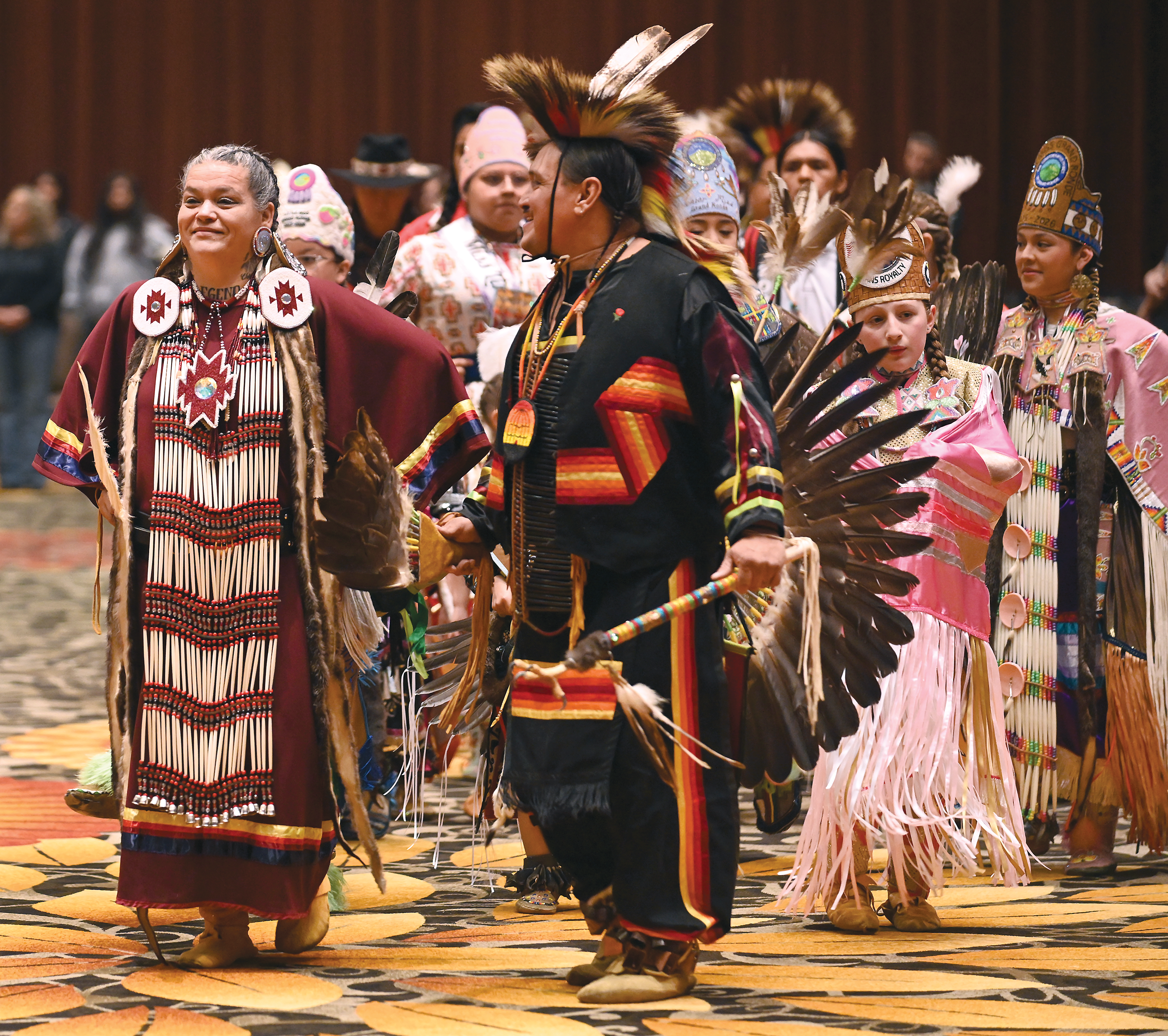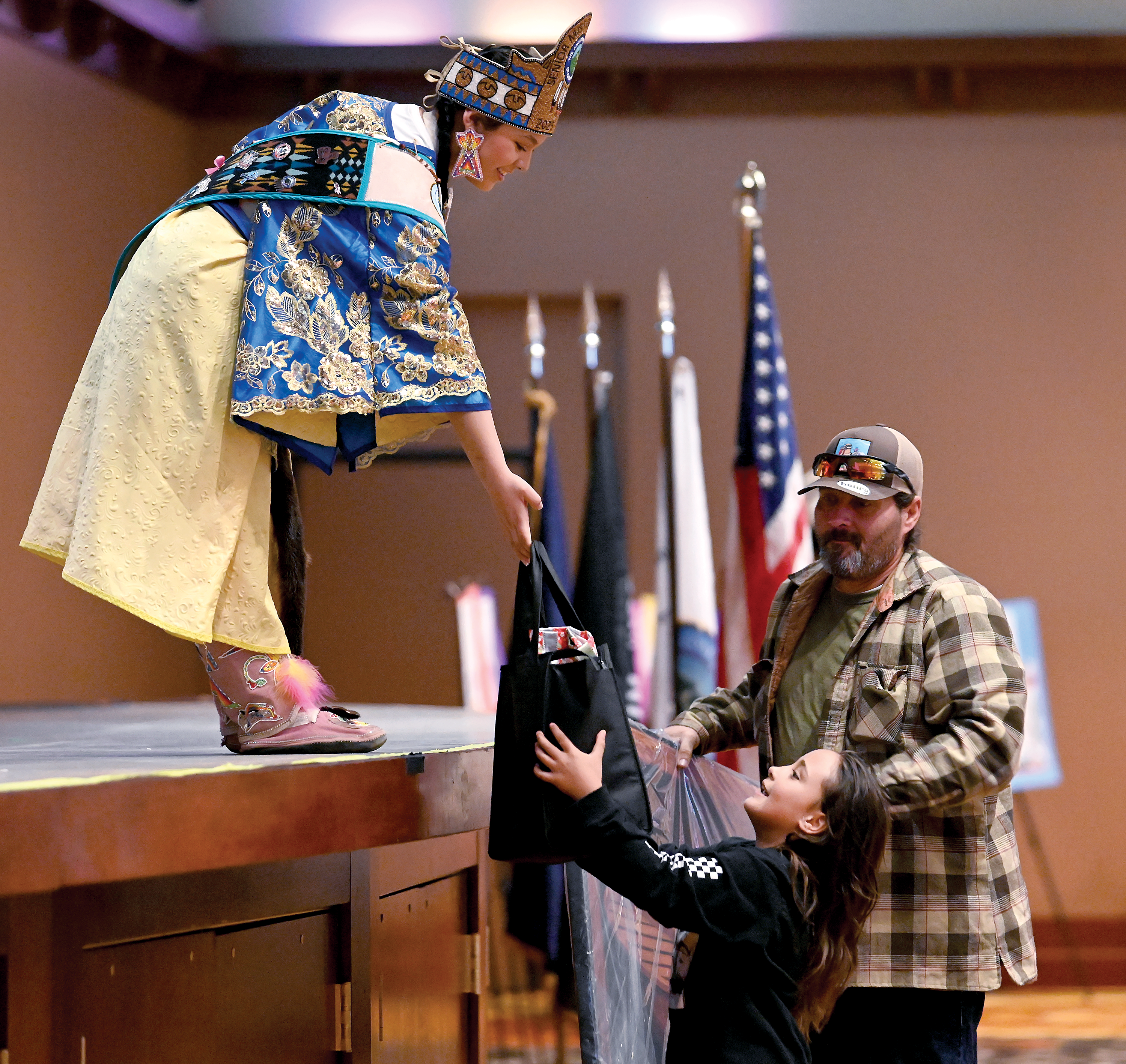Culture
Restoration Celebration recalls the fight for sovereignty, land

By Nicole Montesano
Smoke Signals staff writer
On Friday, Nov. 21, Tribal members gathered again at Spirit Mountain Casino’s Event Center to celebrate, drum, dance, eat and honor the Tribe’s accomplishments since it was restored in 1983. The celebration continued with the annual Restoration Celebration Powwow Saturday, Nov. 22.
Forty-two years after Restoration, the Tribe rejoices in a sprawling campus that includes a governance center, health and wellness building, school, library, gym and numerous other resources, as well as a casino that forms the bedrock of the Tribe’s economic engine.
“This is the greatest thing that the Tribe can celebrate, it really is,” Tribal Council Chairwoman Cheryle A. Kennedy told the assembled members at Friday’s event, before embarking on a history lesson.
“I want this to be a teaching moment for your children, our young people who did not experience termination,” she said. “I always want our young people to know that what you have and see today is not a given. This is something unique, very special, a gift from God for us to be able to gather together and also celebrate our Restoration.”
Tribal Council Secretary Jon A. George served as the event emcee. In addition to George and Kennedy, Tribal Council Vice Chair Chris Mercier and council members Kathleen George, Lisa Leno and Matthew Haller were in attendance.
Tribal Elder Ronne Riggs Johnson gave the invocation.
A lunch of salmon with cranberries and walnuts, autumn greens, roasted acorn squash, sweet potato casserole, mashed potatoes, pot roast, chicken and mushrooms, berry cobbler and mini red velvet cupcakes was served at 11:30. There was also a gluten-free selection offered.
The Grand Ronde Canoe Family drummed and sang a meal song and enjoyed a jam session before the event started.

Senior Miss Grand Ronde Marie Quenelle, 15, left, hands Nova King, 7, a bag of raffle prizes as her grandfather, Tribal member Barry Larsen, looks on during the Tribe’s 42nd Restoration Celebration at Spirit Mountain Casino’s Event Center Friday, Nov. 21. (Photo by Michelle Alaimo)
Kennedy told the assembled Tribal members that she wants everyone to remember Termination and Restoration.
“One challenge that I always put out at every Restoration is to know who your treaty signer ancestor is, and it can be multiple ones,” she said. “I know for myself, I have four treaty signer grandfathers. I just want to reflect back on the Confederated Tribes of Grand Ronde. Prior to contact from other people, from other lands, our people lived in western Oregon from time immemorial. So, when you see anyone who is digging in the ground or are finding artifacts, those are ours. Those were what your people had made, had worked on, had used them as instruments for living. We were residents of this land. We occupied the land and we lived off the land.
She continued, “The land was what sustained us. All of our food, you can see the abundance of food that we had here today and it was wonderful. Wonderful food. And we used to take all of the foods that were growing on the lands, we also cultivated them and encouraged them to return, year after year. And we want to return to all of those ways again. And the reason that we stopped doing that was because of the effects of colonization. We no longer had the land for us to take care of and so we could not practice our ways.”
During the 1850s, the United States entered into treaties with Tribes.
“The entering of treaties (with) Tribes was all about taking the land,” Kennedy said. That’s what it was all about. How can we acquire the land. And that’s what happened. We entered into seven treaties. All of us come from those peoples, those treaty signers, who at the time, knew that ‘unless we sign these treaties, we’re going to be extinct, because we will be killed, we will be driven, we will be hunted down, so it’s best for my people to sign treaties,’ and in that treaty, there was the agreement to relocate, to move from your lands that we occupy down in southern Oregon, northern California, southwest Washington.”
This culminated in Tribes being forcibly relocated to the Grand Ronde Reservation beginning in 1856, known as the Oregon Trail of Tears, which had a devasting effect on Tribal ancestors.
“We moved, as we were driven,” Kennedy said. “It wasn’t a little walk, though, a ‘tiptoe through the tulips’ walk; it was a very dangerous walk. It was in the dead of winter. It was walking on your feet for hundreds of miles, with moccasins that were thin-soled and often wore out on the way here. It was a terrible time for our people. I know that my treaty-signer from the Umpqua was driven up here; he and his wife and their sons, and he was killed on the way here.”
She noted that in the decades following the Tribes’ removal to the Grand Ronde Reservation, various government actions whittled down the Tribe’s land base until the federal government terminated its recognition of the Tribe altogether in 1954.
“So, the land that you’re walking on, that we’re living on today, was all taken away. We did not have anything left at all, except our cemetery that is in continuous use today, that buries our ancestors,” Kennedy said.
She noted that the Tribe’s Cultural Resources Department is still working to record family stories and to collect artifacts to be displayed at Chalchalu Tribal Museum & Cultural Center.
Tribal Elder Josephine Ingraham said she was finding Restoration “really emotional,” and that she did not know growing up that she was a Tribal member.
“My grandma married in 1942,” she said. “She moved away and she didn’t look back.”
At a garage sale in 1987, she said, her neighbor told her he knew her family in Grand Ronde, baffling Ingraham, who was unaware of any family members in Grand Ronde.
He provided her with the name and phone number of a friend of her grandmother, she said, but when she called, the woman told her “I can’t talk to you,” and hung up. That incident touched off Ingraham’s curiosity and she began researching her genealogy.
In 1999, she and her mother were enrolled as Tribal members.
On Saturday, Nov. 22, the Tribe held its annual Restoration Celebration Powwow, following a morning prayer at the cemetery. The doors opened at 9 a.m. Grand entry was at noon and 6 p.m.
George was also emcee for the powwow. The arena director was Tribal member Levi Liebelt. Head man and head woman were Tribal members Chad and Molly Leno. The host drum was Northern Blackhorse.
Dance specials included golden age by the Elders Activity Center, Marion Mercier Fancy Shawl by Adult Education, tiny tots by Tribal Council, all-in-all by the Health & Wellness Center and Ampkwa Advocacy Red Regalia for all ages. There was also a fill-the-blanket dance, an owl dance, and a head man/woman special potato dance for all ages. Coming out/returning to the circle was performed at 10 a.m. Youth Empowerment & Prevention put on a “street style” dance special for ages 14 to 24, with one song and three winners who each received a $500 budget to either start or add to their regalia.
